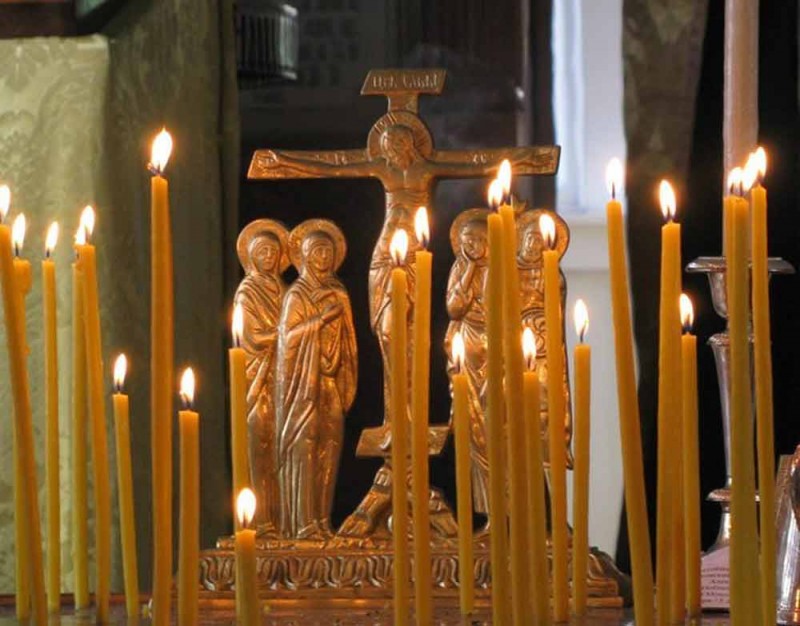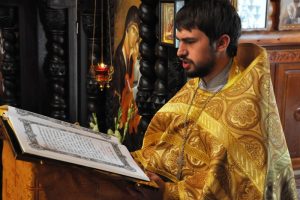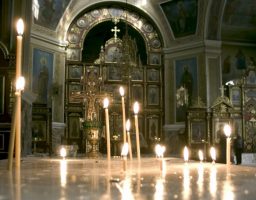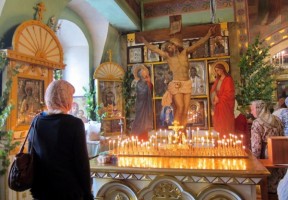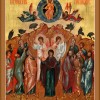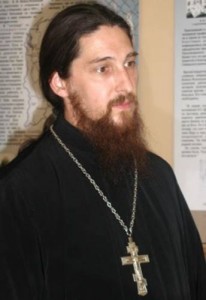 The other day I performed the funeral service for an elderly woman. Afterwards I turned to the relatives with some parting words. As is customary in such cases, I spoke about how all are alive with God, about how our goal is to achieve grace-filled union with Him, and about how the only thing keeping us from achieving this goal is our sin. And since, unfortunately, people do not always manage to yield worthy fruits of repentance, we need to pray fervently for the forgiveness of the sins of our departed kinsmen. And in order to influence their lot favorably in the afterlife, and in order for our prayers to be heard, we need to strive to live according to God’s truth, because there is a direct relationship between our spiritual, moral condition and the efficacy of our prayers.
The other day I performed the funeral service for an elderly woman. Afterwards I turned to the relatives with some parting words. As is customary in such cases, I spoke about how all are alive with God, about how our goal is to achieve grace-filled union with Him, and about how the only thing keeping us from achieving this goal is our sin. And since, unfortunately, people do not always manage to yield worthy fruits of repentance, we need to pray fervently for the forgiveness of the sins of our departed kinsmen. And in order to influence their lot favorably in the afterlife, and in order for our prayers to be heard, we need to strive to live according to God’s truth, because there is a direct relationship between our spiritual, moral condition and the efficacy of our prayers.
Having said all this and parted with the relatives, I walked over to my car. Here a woman approached me and said: “Batiushka, you were just saying… But we can’t influence someone’s lot in the afterlife. Remember what it says in the Bible: ‘A brother entreats not his brother.’” I did not remember such words, and honestly admitted this, but did remind her that the Bible is an integral book and that it is wrong to rip certain pieces out of context, without understanding why, when, by whom, and to whom it was spoken. This woman, however, continued along her own lines: that after death people receive only what they have earned and that the prayers of loved ones are of no effect and cannot ease their lot. She particularly insisted that the Bible says nothing about such a relationship towards the dead, that is, that there is no point praying for them and that one cannot be of any help to them.
I like such unexpected encounters, but unfortunately other people were already waiting for me and it was not possible for us to speak in more detail. I only invited this woman to come talk in church. There is some doubt about whether she will come, but of course there is always hope. Anything can happen in life! The one thing that put me on guard was that there was something deliberate and stubborn in her words; it was a pity that I did not manage to ask her if she belonged to a particular denomination. Oh well…
So, is there any mention in the Bible that prayer for the departed makes any sense? And can prayer influence the lot of our loved ones in the afterlife? These questions are interesting and important. I would like to speak about them more substantively. Perhaps the kind woman whom I met will read what I have written and our conversation will thereby continue; or perhaps she will come, if not to my church, then to another. In any case, I would like this very much.
Let’s start with this. What made me think that the origins of this woman’s reasoning were heterodox? These words: “It’s not in the Bible.” This is a typically Protestant way of posing the question. But here is the problem: regardless of the Bible’s exceptional importance, this holy book does not exhaust all the fullness of life in all its multiplicity, including the spiritual life of all mankind, of various nations, and of everyone individually. One might say that the Bible is an expression, an essential embodiment, of this life. But the Bible itself is also part of this life. Is everything that remains unwritten, everything that remains beyond the inscribed words, really not life, not covenant, not the continuation of the immediate and living relationship of God and man?
It is important to remember the following, too. The Lord established the Church, in which our salvation is carried out through inscrutable means, and it is the Church that is, in the words of the Apostle Paul, the pillar and ground of the truth (1 Timothy 3:15). The Church is the Body of Christ. That is, it is Christ Himself, living here and now, speaking with us, and revealing His will to us, who are being pardoned and saved… This is very important to understand. The Church is that very life of which we can and should partake; we should heed its voice, because it is the voice of God, His words, which are eternally generated and eternally addressed to us. To rip the Bible from the context of the Church and then try to understand something in it, no matter how harsh this may sound, is a perfectly hopeless activity. The only positive outcome of such reading or study of the Bible is that someone might come to the Church and become a real participant in the life of Christ. Then everything will fall into place and the words of Scripture will acquire great transfiguring power for man, becoming that very twoedged sword that pierces even to the dividing asunder of soul and spirit (Hebrew 4:12).
Besides Holy Scripture, in the Orthodox Church there is also Holy Tradition, that is, truth that continues to enlighten us, instructing us not only from the pages of the Bible, but by the examples of the lives of holy people in word, in conversation, in charity, in spirit, in faith, in purity (1 Timothy 4:12). We are taught through the saints by the Holy Spirit, by Whom the Church was established and in Whom it lives in all its conciliar fullness.
He that heareth you heareth Me; and he that despiseth you despiseth Me (Luke 10:16), said the Lord to His disciples. Not everything He taught His disciples was recorded, of course. Much has been preserved, and continues to be preserved, with exceptional reverence and awe as Church Tradition. Incidentally, this Tradition, which had been passed down from mouth to mouth, was in time recorded in various books apart from the New Testament. This includes the epistles of the Apostles’ closest disciples, and then of the disciples of these disciples, and so on. But one should not think that that the truth passed down from mouth to mouth has inevitably become distorted, as in the “telephone” game. Such distortion (inevitable in everyday matters) is unthinkable in church matters, particularly with regards to that which relates to our salvation, because the Church is truth itself, Christ Himself, and is constituted and guided by the Holy Spirit.
It is important to understand that our human, sinful estimations and criteria do not apply to the Church. All the lawlessness, delusion, and disorder that we see, often even in the churchyard, towards the Church and its essential makeup has no bearing. Therefore, it is important to remember that what belongs to the Church is its nature, its divine and indisputable nature; that which is human and sinful appertains, one might say, to the margins or fringes of the Church. In order to grasp all this, one doubtlessly needs to be within the Church, to be a partaker of that Spirit of Christ in Whom the Church lives, and moves, and has its being.
The Church has always lived by the belief that people’s lot in the afterlife is not ultimately decided until the Dread Judgment and that those living here on earth can favorably influence the lot of their family and loved ones in the afterlife. I repeat: this teaching has always existed, but it acquired effective force with the Savior’s coming into the world, thanks to His redemptive sacrifice for our sins. We will try, however briefly, to sketch the history of prayer for the departed in the Church of the Old and New Testaments.
Although we know that before the Savior’s coming into the world the lot of people in the afterlife varied, yet it remained sorrowful and desolate by force of the complete domination of sin over man. Yet in the Old Testament we find examples of the prayers of people living on earth for the departed.
The most striking such example is the prayer of the Jews for their brethren who had perished on the field of battle.
Following battle with the Edomites, things consecrated to the idols that had been seized as booty were found under the coats of the slain Jewish soldiers. Inasmuch as acquiring these had clearly been sinful, every man saw that this was the cause whereof they were slain. Then the Jews turned to God in prayer: they besought Him that the sin committed might wholly be put out of remembrance. Moreover, having made a gathering from all those present, Judas Maccabaeus sent the offering to the Temple in Jerusalem to offer a sin offering for the departed. In the words of Scripture, he did this very well and honestly, in that he was mindful of the resurrection. That is, he was concerned for the forgiveness of his brethren at the Dread Judgment: Whereupon he made a reconciliation for the dead, that they might be delivered from sin (cf. 2 Maccabees 13:39-45). This passage is wholly adequate to understand that in Old Testament times a tradition of prayer and sacrifice for the departed existed.
One might say that this tradition was of prophetic character, because the actual spiritual position of people of that time did not leave them hope for deliverance from the bondage of sin. This hope extended into the future and was bound up with messianic expectations and presentiments.
Now, with regards to “A brother entreats not his brother.” I can immediately state that there are no such words in the Bible, but we can assume that this woman had in mind the following words from the Psalter: A brother cannot redeem; shall a man redeem? He shall not give to God a ransom for himself (Psalm 48:7-8). Assuming that these are the words she had in mind, let us try to understand what they mean.
This psalm contains words of warning addressed to those living here on earth, that they might remember the Dread Judgment and not place their hope on their wealth, power, and authority, but rather strive to spend their earthly lives in repentance and purity. The primary subject matter of the verse is denunciation of the unrepentant. For at the Dread Judgment no one will deliver us from God’s righteous judgment – neither anyone on the side, nor even our closest friend, such as a loving brother.
But note that this specifically concerns the Dread Judgment, which is the final and deciding word. Up to this point, according to the teachings of the Holy Fathers, there is still time for repentance for those living here on earth and for propitiating the Lord by offering spiritual and material sacrifices to Him for the departed.
St. Basil the Great interprets this passage to mean that all the people of the Old Testament, and even the prophets, were bound by sin and therefore did not have the power to release anyone from the bonds of death. But the Lord Jesus Christ, perfect Man and perfect God, redeemed us from eternal death by His power; in Him we have hope and trust for salvation.
That is, the relationship towards the lot of the departed in the afterlife in Old Testament times and after the Savior’s coming into the world vary precisely by the fact that the Lord, by His redemptive sacrifice, gained the power to change people’s lot in the afterlife from worse to better. We also know this from Christ’s descent into Hades, where he freed not only the righteous, but also repentant sinners from painful bonds.
There is no doubt that only the Lord can determine someone’s lot in the afterlife; there is also no doubt that this lot depends directly upon this person’s faith and way of life here on earth. But there is likewise no doubt that it is possible, and even necessary, to pray for our family and friends, asking the Lord for the forgiveness of their sins; there is also no doubt that these prayers will not be in vain if only we ourselves strive to listen to the Lord and to live according to His commandments.
To sum up, one might put it this way. Prayer for the departed, especially fervent prayer filled with love and self-sacrifice, is pleasing to God; and, if one may put it this way, it inclines His mercy towards him who is praying and towards this fulfillment of his entreaty. We find much support for this in the New Testament. Thus, the Lord Himself says: And all things whatsoever ye shall ask in prayer, believing, ye shall receive (Matthew 21:22). The Apostle James commands: pray one for another (James 5:16). The Apostle Peter appeals: see that ye love one another with a pure heart fervently (1 Peter 1:22), not limiting this love to this earthly life. Moreover, out of the abundance of the heart the mouth speaketh (Matthew 12:34), and for a believer the primary expression of this fullness is prayer, including prayer for loved ones.
The most important thing here is that the compassion, mercy, and love expressed by someone when praying for the departed is pleasing to God and attracts His grace, because these qualities – love, mercy, and compassion – are the very qualities of God Himself.
Translated from the Russian.












